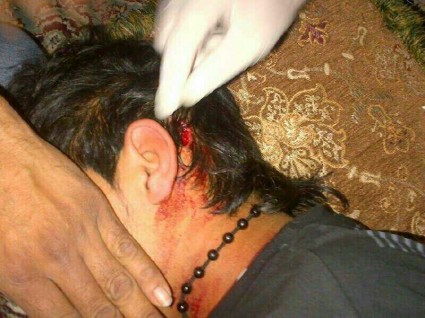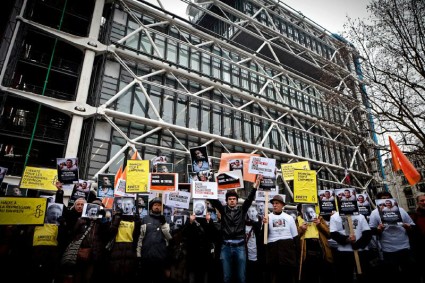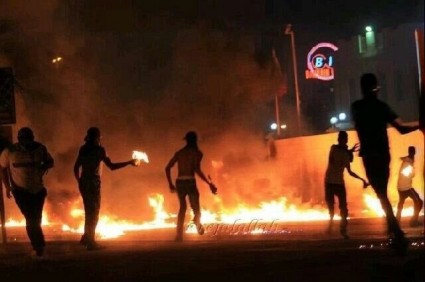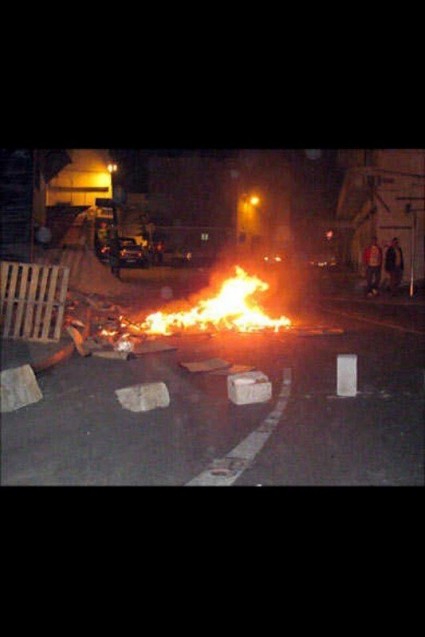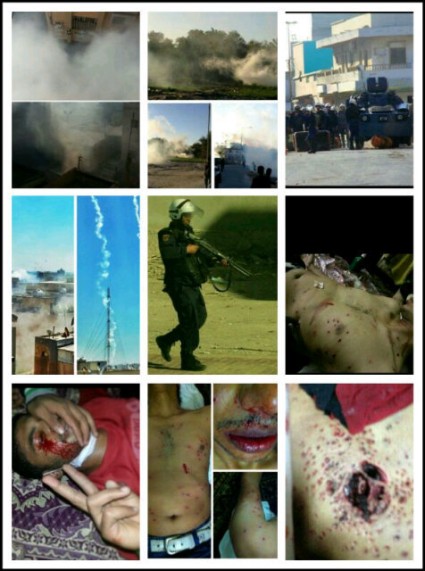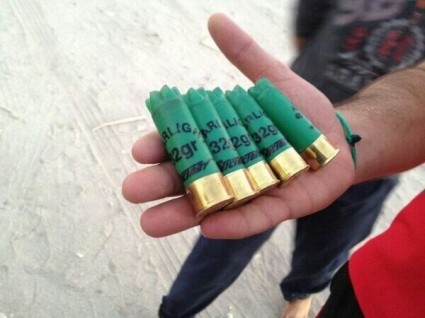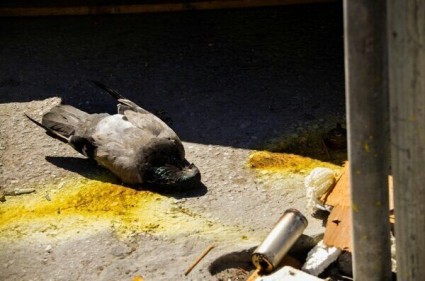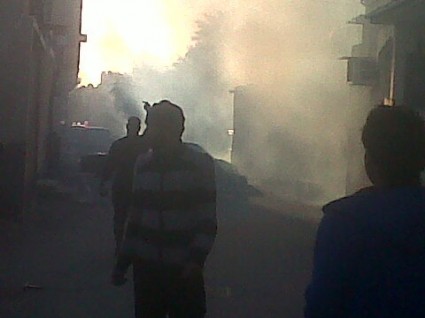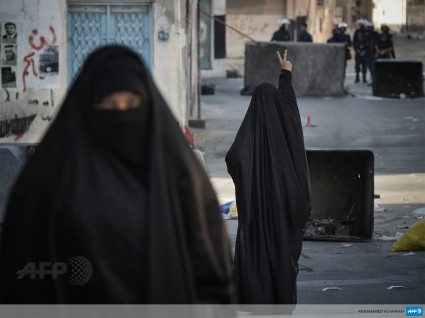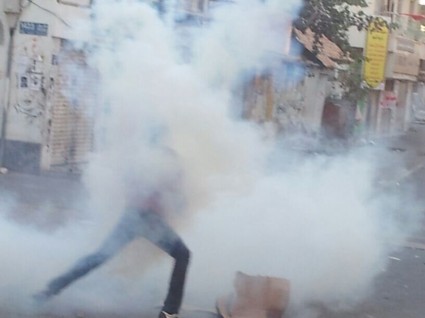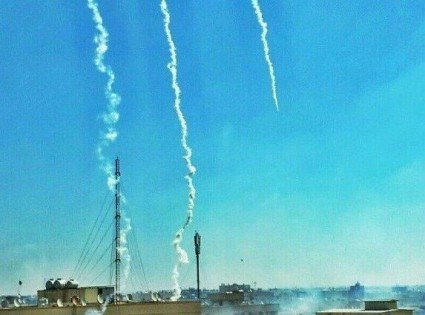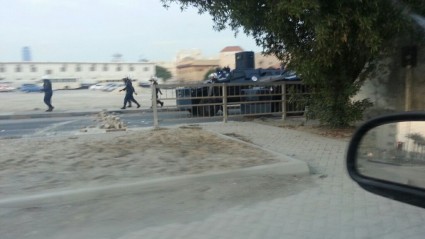Posts from — February 2013
Unsung Heroes – Ibrahim Sharif in al Khalifa’s Prison for Standing Up for Free Bahrain
Some of the world’s bravest dissidents are pursuing their fight against injustice with little attention from the outside world. But that doesn’t mean they aren’t worth knowing about. Here’s a list of remarkable people who rarely make it into the headlines.
Unsung Heroes
3 October, 2012 – Tom Malinowski – Foreign Policy
The head of the National Democratic Action Society Wa’ad Party in Bahrain, Ibrahim Sharif played a leading role in the pro-democracy protests last year and was imprisoned for the crime of calling for a change in the island monarchy’s system of government. He’s since been sentenced to five years in jail.
Most supporters of the opposition in Bahrain are members of its disenfranchised Shiite Muslim community. But Sharif is a Sunni, as are many members of his pro-reform political party. His existence, as an opposition leader and political prisoner, undermines the Bahraini government narrative that the crisis in the country is purely sectarian, that the protest movement is part of an Iranian/Hezbollah plot to establish a Shia theocracy, and that the country’s Sunni population is unalterably opposed to compromise. That a prominent Sunni, with some support in the Sunni community, is calling for constitutional monarchy in Bahrain appears to have deeply embarrassed the hardliners around the country’s king. Unfortunately, Sharif’s case has not gotten as much attention as that of other prominent Shiite political prisoners in Bahrain. Last month, a civilian appeals court upheld his sentence, along with 19 others, even though Bahrain’s Independent Commission of Inquiry found that the evidence against them consisted of their speeches or confessions extracted through torture. …more
February 19, 2013 No Comments
Firelight of Revolutions Morning
February 19, 2013 No Comments
Funeral for 36 Year Old Ameena Sayed Mahdi Sayed Abdullha Murdered by Bahrian Security Forces
A woman dies due to asphyxiation from regime’s lethal gasses
15 February, 2013 – littlemediatv.com
The regime in Bahrain continues the deliberate killings against citizens in their houses through the use of lethal tear gas deliberately thrown and fired at houses and in neighborhoods in order to cause deaths among the innocent.
Ameena Sayed Mahdi Sayed Abdullha, 36 years old, who lives in Abu Saiba village, died on Wednesday, February 13, as a result of being exposed to lethal tear gas which was heavily thrown in her houses, and led to the deterioration of her health and death later on, as reported by family members.
Her family said that she lived in the east of Abu Saiba where riot police frequently throw gas canisters. After a month she went through severe health deterioration as a result if inhaling the gases. She was admitted to the recovery room in Salmaniya Medical Complex, however, just a few days ago the doctor on duty called her family to inform them on her poor health condition and the complications that impacted her lungs and kidneys alongside other symptoms, which led to the loss of her live as a result.
The residents in the area pointed out that they filed a complaint in the security center and presented their statements to the public prosecution and confirmed that the martyr’s house was very often mainly subjected to lethal gas attacks and that she had died as a result of this.
The regime forces have caused deaths to many due to the use of toxic and lethal gassed, as they deliberately throw these gasses on houses, and this has been documented by cameras and witnesses in their areas. These ongoing practices are within the official terror which aims to undermine the security and target citizens for their pro- democracy stances to end the dictatorship. …source
February 19, 2013 No Comments
Russia must beware of West chicanery over Bahrain, Syria
Russia must beware of West chicanery over Bahrain, Syria
Mon Feb 18, 2013 – By Finian Cunningham
It would be a grave mistake for the Russian government to adopt the premise of Syria and Bahrain as being somehow equivalent and reciprocal. The former is a case of outright criminal aggression by cynical foreign powers; while Bahrain is a clear case of a people genuinely demanding democratic rights. They are separate and non-negotiable.”
Moscow should be careful not to buy into recent cosmetic efforts by the West to revamp its Persian Gulf client monarchy – and to sell the Bahraini people short for the sake of saving its ally in Syria.
As Bahrain marked the second anniversary of its popular uprising on 14 February, the embattled Western-backed monarchy has renewed attempts apparently to seek a negotiated political settlement with various opposition groups to its two-year crisis.
However, many analysts both within and outside the Persian Gulf kingdom see the new push for “national dialogue” as nothing more than a cynical political maneuver by the Sunni regime to buy off a popular, mainly Shia, challenge to its unelected rule. The ulterior agenda of the talks process, which opened on 10 February, is not to produce a genuine democratic political solution, but rather to revamp the corrupt status quo with a sticking-plaster appearance of reform.
This is where Russia’s recent engagement in Bahrain’s political affairs should tread carefully.
Ahead of the kingdom’s political dialogue, the Russian foreign ministry hosted a delegation from Bahrain’s main extant opposition group, Al Wefaq, in Moscow. The word “extant” is used advisedly here because most of Bahrain’s more critical opposition to the regime is in prison, some of whom are serving life sentences on trumped-up charges of subversion.
The Wefaq delegation to Moscow earlier this month was led by Sheikh Ali Salman, the top figure in the mainly Shia political organization, who held talks with Russia’s deputy foreign minister Mikhail Bogdanov.
Bogdanov also met on 8 February with Bahrain’s ambassador to Russia, Hashim Hasan Al Bash. Following the series of meetings, the Russian foreign ministry said in a statement: “Russia will continue to hold contacts with the kingdom’s leaders as well as representatives of opposition groups in firm support of efforts to resolve internal problems through a national consensus in the interests of all Bahrainis.”
If we give Russian diplomats the benefit of doubt, one could see their belated efforts as a well-meaning attempt to help resolve the conflict in Bahrain, where over the past two years some 100 people have been killed in clashes with state forces and thousands have been injured and imprisoned – huge numbers relative to the tiny national population of less than 600,000.
From this seemingly benevolent Russian intervention, Moscow stands to gain some kudos in the strategic Persian Gulf Arab region where the Sunni monarchies ruling over the oil-rich sheikhdoms of Saudi Arabia, Kuwait, Qatar, Oman and the United Arab Emirates are staunch allies of the Al Khalifa regime in Bahrain. Some 30 per cent of all of the world’s shipped oil trade passes every day out the Persian Gulf, and Saudi Arabia is the world’s top oil exporter, producing 10 million barrels per day.
This strategic factor points to a connection with Syria. Russia’s engagement in Bahrain – an established British and American sphere of influence – comes at the same time that Moscow is stepping up diplomatic efforts with its Soviet-era Syrian ally to find a political solution in that country.
Syria has also been racked by two years of relentless violence, where an armed insurgency against the government of President Bashar Al Assad has been equipped and funded by the Persian Gulf monarchies, as well as by the US, Britain, France and other NATO powers, including Turkey and Germany.
The Russian foreign ministry alluded to Moscow’s joined-up diplomacy when it said: “We are certain that it’s possible, with enough political will, to ease the tensions and resolve the causes of the conflict in Bahrain as well as in other countries in the region.”
Somewhat surprisingly, recent moves towards political negotiations in Syria appear to be bearing fruit. After months of intransigence towards the government in Damascus, Moaz Al Khatib, the leader of the exile opposition group, the Syrian National Coalition, suddenly announced that the SNC is ready to negotiate a political transition with President Assad. The Syrian government has reciprocated with senior members meeting opposition groups and saying that it is ready for talks with “no preconditions”.
This rapid change in political gear is best understood in the light of punishing setbacks inflicted by the formidable Syrian national army on the Syrian insurgents and their foreign mercenary networks. It therefore seems now that the West’s military option of removing Assad by force is spent.
After two years of futile skirmishing and some 70-80,000 deaths, the Western powers and their regional Sunni Arab and Turk allies have come to the realization that their desired goal of regime change in Syria is not going to happen under Plan A, namely armed subversion. Plan B – a political process – now seems to be more a feasible route.
An integral part of this trade-off is Bahrain. If Russia can help bolster the Bahraini opposition and inveigle it into accepting political terms with the Western and Saudi-backed Al Khalifa regime, then the West and the Persian Gulf monarchs will reciprocate by easing the pressure on the Assad government in Syria by: a) reducing the supply of arms to the militants in Syria, which recent reports indicate is the case; and b) pushing the SNC group into accepting negotiations with Assad, which up until recently was a non-starter but now appears to be underway.
Despite its relatively small size, Bahrain has huge strategic value. It provides the base for the US Navy’s Fifth Fleet and a Western military projection point across the entire Middle East. Moreover, the democratic uprising in Bahrain threatens the entire Sunni monarchial realm that presides over the Persian Gulf and which is the lynchpin of the American petrodollar global economy. Ongoing political unrest in Bahrain is a mortal threat to these vital Western interests. Therefore, it is imperative that Washington, London and the Sunni oil sheikhdoms find a way of “restoring order” in Bahrain. An implicit deal with Russia over Syria would be more than a worthwhile trade-off.
The question is: does the Bahraini pro-democracy movement stand to lose out in any grubby political quid pro quo? Or as a member of the 14th February Coalition – a revolutionary opposition group that has repudiated dialogue with the regime – put it disdainfully: “Are we being sacrificed in the bigger picture of regional geopolitics?”
For a start, the supposed “Arab Spring” comparisons between Syria and Bahrain are invalid. In Syria, the Assad government has a democratic mandate and retains popular support. The so-called uprising, championed by Western governments and news media with romantic, heroic prose, is in reality an externally driven terrorist insurgency that has no legitimacy among the mass of Syrians. This systematic violence has been fomented covertly and criminally by foreign powers.
While there is cause for political reforms in Syria – in what country is there not? – it is completely fallacious to ascribe the turmoil over the past two years to an Arab-Spring-style popular uprising for democracy. The upheavals in Syria are the manifestation of an illegal policy of regime change by Western powers and their Sunni Arab and Turk allies – all of which see the removal of Assad as an opportune blow against Shia Iran.
By contrast, for the past two years Bahrain has indeed witnessed a genuine popular uprising that conforms to the normative meaning of the Arab Spring pro-democracy movement, which swept the Middle East and North African region from Tunisia to Egypt, Morocco, Jordan and Yemen in early 2011 and continues to reverberate. (Libya is another anomaly of the Arab Spring, as with Syria, which was less about genuine popular uprising and more about opportunistic NATO regime change.)
The majority of Bahrainis are demanding the right to have an elected government. The people, who are mainly Shia, want an end to the autocratic rule of the Sunni Al Khalifa monarchy that was imposed on them when the old colonial power, Britain, granted nominal independence in 1971. Tellingly, the Western governments and their subservient news media have largely ignored the plight of the Bahraini people, which by normal reasoning is a righteous cause deserving full support and media coverage.
Saudi Arabia and the other Persian Gulf absolute monarchs have sat nervously and parlously throughout these seismic regional shocks. Popular protests and any signs of incipient dissent within the Persian Gulf enclave have been ruthlessly suppressed in Saudi Arabia, Kuwait, Qatar, Oman and the United Arab Emirates. These monarchs’ fears of a pro-democracy contagion is why they supported the invasion of Bahrain in March 2011 by the Saudi-led Peninsula Shield Defence Force to try to crush the Bahraini uprising. Yet, ironically and somewhat hilariously, these same Arab despots have lent copious diplomatic and material support to alleged pro-democracy uprisings in Libya and Syria.
Despite the ruthless repression in Bahrain, with Western acquiescence, the pro-democracy movement continues unabated. Indeed this past week, which marked the second anniversary of the uprising, has seen even greater numbers of demonstrations across the island. A 16-year-old youth, Hussein Al Jaziri, was shot dead in the village of Daih by regime forces, bringing even more protesters on to the streets. The previous week saw the deaths of 87-year-old Habib Ebrahim and eight-year-old Qassim Habib who both died after Al Khalifa uniformed police thugs saturated the villages of Malikiya and Karbabad with toxic chemical gas.
Popular outrage and demand for the downfall of the Khalifa regime has thus become even more determined and strident. The majority of the people do not want negotiations with the despised regime nor a “constitutional monarchy” – the people want the Khalifa dynasty to simply get the hell out of their lives and to make way for an elected government. “Freedom with dignity” is one of the people’s chants.
Saeed Shehabi of the Bahrain Freedom Movement said there should be no political dialogue with the Bahraini regime because it has shown itself to be illegitimate over years of systematic brutal repression and corruption at the expense of the majority of the Bahraini people. Shehabi said that the Bahraini people are well aware of the congenital Al Khalifa political maneuvers and sham political processes down through the decades in order to preserve its hold on power and privilege. He said: “It is clear from the insistence of the people of Bahrain that they believe that reform is not possible with this regime.”
American Middle East political analyst Dr Colin Cavell, who formerly taught at the University of Bahrain, shared this assessment. He said: “I agree with Saeed Shehabi that the people of Bahrain should not engage in political talks with the Al Khalifa junta, as their offer of dialogue is disingenuous and merely a show for the international media and a complete ruse.”
As already noted, Bahrain’s more radical opposition leadership has been imprisoned. They include redoubtable figures like Hasan Mushaima, Abduljalil Al Singace, Adbulhadi Al Khawaja and Nabeel Rajab, who have the respect and loyalty of the wider population. Some of these leaders are serving sentences of life imprisonment simply because they called for the unelected Khalifa regime to stand down and to be replaced by a republican form of government. This viewpoint resonates with the majority of the people who are continuing to protest on the streets calling for the downfall of the regime despite the recent opening of dialogue.
It is highly significant that the Wefaq opposition bloc, which met with the Russian foreign ministry, has given notice that it is willing to accept a political settlement with the Khalifa regime that would involve the coexistence of “constitutional monarchy” alongside an elected government. This is not what the majority of Bahrainis want. For the majority of Bahrainis, the continuance of the Khalifa regime in any shape or form in the public life of Bahrain is unacceptable. The violence and violations that the regime has committed makes any tolerance of a remnant anathema to the vast majority of the people.
It is also significant that Washington and London, the primary sponsors of the Khalifa rulers, have assiduously courted the participation of Wefaq in the latest political dialogue with the regime.
Writing in the Washington-based publication, The Hill, on 12 February, former director of US National Intelligence Dennis C Blair said that the US goal “should encourage moderate leaders within the Bahraini government and moderate leaders in the opposition… a gradual transition to a constitutional democratic monarchy is in Bahrain’s best long-term interest.”
Blair was, of course, too coy and cynical to say that this arrangement was also in Washington’s best interest. And, mischievously, he went on to describe Bahraini opponents of the Khalifa regime and its dialogue process as “hardliners”. That is a deft way of delegitimizing political voices that are outside the realm of tolerance to those in power and their patrons.
This is typical top-down political engineering. Washington, London and the Saudi patrons of the completely unacceptable regime in Bahrain are trying to force a political “compromise” on the Bahraini people – a compromise that leaves the regime intact and is far short of what the people want or deserve. By way of making this squalid solution palatable, the Western powers are trying to bestow legitimacy on any such ostensible “deal” by involving the participation of the Wefaq opposition bloc, thus providing a veneer of popular participation and consent.
But this is the politics of expedience and deception, not the politics of democratic freedom, rights and principle. It is the politics of extending cover to the selfish geopolitical interests of Washington, London and the Persian Gulf monarchs, not the politics of supporting the Bahraini people who have been denied their natural rights for more than four decades.
It would be a grave mistake for the Russian government to adopt the premise of Syria and Bahrain as being somehow equivalent and reciprocal. The former is a case of outright criminal aggression by cynical foreign powers; while Bahrain is a clear case of a people genuinely demanding democratic rights. They are separate and non-negotiable.
In the long term, Russia’s foreign policy would be more sustainable, ethical and rewarding if it was based on defending, absolutely, the national sovereign rights of Syrians, that is, without any contingent quid pro quo; while at the same time supporting, separately, the sovereign aspirations of the Bahraini people – and not on affording political cover to self-serving Western imperialist intrigues and collusion with Arab despots. …source
February 19, 2013 No Comments
Bahrain opposition parties: no legitimacy for any solution without the people’s say
The National opposition forces in Bahrain stressed that it is important to respond to the demands of the political majority of the people of Bahrain and to stop turning a blind eye on the clear demands that have been raised by the people two years ago for change and transition to democracy.
Bahrain opposition parties: no legitimacy for any solution without the people’s say
14 February, 2013 – ABNA
(Ahlul Bayt News Agency) – The opposition parties said that the use of violence and force against peaceful demonstrations for the people’s legitimate demands has resulted in the death of many, while hundreds are still in detention and are tried for charges relating to freedom of opinion and expression. With all mentioned, there’s no indication for a serious desire for change as arrests and unfair trials continue.
The final communiqué issued by the opposition parties following the protests which took place in many areas across Bahrain Wednesday (13th Feb 2013) stated that what Bahrain needs is an inclusive political solution which hands power to the people, ending the state of dictatorship, authoritarianism and monopoly in order to start a new phase in which the people are the source of sovereignty and decision in all issues.
The opposition parties stressed that any political solution must be referred to the people through a referendum or a constituent council to obtain the voice of the majority. Any solution that is not approved by the people will be of no legitimacy and will be considered incomplete, and will not be able to achieve long-term stability for Bahrain, they stated.
The opposition also stressed that the suppressive security method cannot end the national demands of the political majority of the people. Such fantasy is impossible because these demands go back to more than a century ago.
The opposition parties praised the citizens in Bahrain for their adherence to the peaceful approach in the pro-democracy movement despite the huge sacrifices and official violence and terror, the nonviolence of the people has defeated the official tyranny and proved to the world how the people of Bahrain are civilized. …source
February 19, 2013 No Comments
Bahrain: Still paying a heavy price for freedom
Bahrain: Still paying a heavy price for freedom
14 February, 2013 – Amnesty
Prisoners of conscience remain behind bars two years on from 2011 protests, said Amnesty International today.
Amnesty International supporters demand the release of prisoners of conscience in Bahrain.More people have been imprisoned since then for peacefully expressing their views, whether on social media or by participating in protest marches, a new briefing reveals.
“The government of Bahrain cannot carry on imprisoning people simply because it can’t take criticism,” said Hassiba Hadj Sahraoui, Amnesty International’s Middle East and North Africa Programme Deputy Director.
“It’s time that people detained simply for exercising their right to freedom of expression be released and for the harassment of other activists to desist.”
Last month, Amnesty International conducted a mission to Bahrain where it met with seven prisoners of conscience detained in Jaw prison. All of them reported they had been jailed on false charges or under laws that repress basic rights.
Mahdi’ Issa Mahdi Abu Deeb, a teacher’s trade union leader who has been in jail since his arrest in 2011, told Amnesty International: “As for the charges against me and Jalila [Jalila al-Salman, a fellow teachers’ union leader and mother of three], no one thinks they are right: we did not call for the fall of the regime – we are people in the education system.”
Mahdi’s daughter, Maryam, recently made this appeal for her father.
In a series of meetings with government officials, Amnesty International urged the authorities to release all prisoners of conscience, lift restrictions on freedom of expression, association and assembly and bring those who committed human rights abuses against protestors to justice.
“No convincing evidence had been submitted to justify these convictions,” said Hassiba Hadj Sahraoui.
“It appears that all of those involved were targeted for their anti-government views and for having participated in peaceful protests”.
Many of the prisoners of conscience were allegedly tortured in the first weeks of arrests.
Some complained about the medical treatment they are receiving. Hassan Mshaima’ said:
“It is harassment as when I go to the hospital for treatment that last up to six hours, my face is covered and cannot see the doctor or the medical staff.”
“Many of the allegations put forward by the prisoners of conscience have still not been investigated by the authorities,” said Hassiba Hadj Sahraoui. “The question remains whether the government will ensure justice is served and uphold the rights of the people.” …source
February 19, 2013 No Comments
Funeral Procession for Aminah Mahdi, murdered by Security Forces
Funeral Procession for Aminah Mahdi in Bahrain
15 February, 2013 – Bahrain Center for Human Rights
Mourners came out in huge numbers today to commemorate the death of Aminah S. Mahdi, 38 years old, who died yesterday in the Abu Saiba area of Bahrain. Many groups have attributed this death to tear gas inhalation. However, the BCHR recognizes that Mahdi had some preexisting medical conditions, and is unable to say with absolute certainty that this resulted in her death. The BCHR is working with doctors, and further examination of medical records is ongoing.
However, what is certain, is that the BCHR has documented 34 deaths in the last two years as a direct result of tear gas. The large numbers of mourners present in the funeral procession represent a nation’s frustration with their government, which continues to indiscriminately fill their communities with toxic gasses. The BCHR asks how many people will die before the government abandons this abusive and illegal form of collective punishment?
The funeral procession was not attacked with tear gas, which is highly unusual in Bahrain. In recent months, the government has attacked victims’ families with more rounds of tear gas while they mourn. See here for two examples, and here for one more.
…source
February 19, 2013 No Comments
Another Teen Murder by Bahrain Security Forces Marks Two Year of Regime Cruelty
February 19, 2013 No Comments
Bahrain Two Years of Death and Detention
February 19, 2013 No Comments
Bahrain on your Anniversary and as Victory grows closer
February 14, 2013 No Comments
Kingdom Falling, Revolutions Morning Sounding Louder, Growing Stronger
February 14, 2013 No Comments
The firelight of nights dark eve calls for Freedom
February 14, 2013 No Comments
Bahrain sees Two plus years of Uprising, Catastrophe Knocks at Hamad’s door
Two years into our uprising, the government must concede to change – or Bahrain faces catastrophe
Bahrain: it’s time to act
14 February, 2013 – UK Guardian
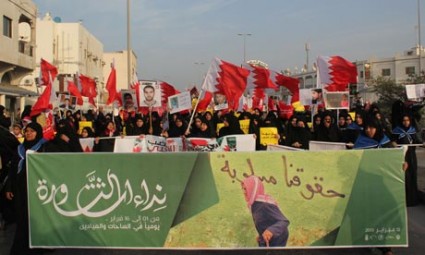
Women march in Bahrain to mark the second anniversary of the uprising.
It is two years on Thursday since thousands of Bahrainis, young and old, male and female, Sunni and Shia, took to the now demolished Pearl Square in the capital, Manama, to demand democracy. They were inspired by the Arab spring, but had decades of their own struggle behind them. This might be the moment to end the stereotype that the Gulf knows only dictatorship.
It’s true that our goal has not yet been achieved. But our uprising is neither a failure, nor was it crushed under the weight of tanks brought over the border from Saudi Arabia. Last week, as part of a series of protests to mark the second anniversary, thousands took to the streets under the banner of “no U-turn”.
That message is clearly understood by the authorities. They agreed, finally, to engage with the opposition in a national dialogue that began this week. It’s in stark contrast to the usual response we have been given thus far: killings, repression, sackings, violence and more. But those human rights violations have remained, and there is no guarantee that this dialogue will bring about reform.
Opposition groups – known as societies, since political parties are not strictly legal – entered into this dialogue in the hope that it would end the stalemate. It is our duty to make the effort to find a peaceful solution, but a political negotiation that has a website, a logo, social media accounts and all sorts of PR-friendly features will undoubtedly be of concern to those who want it to be serious. We have raised questions that have yet to be clearly answered about the process of the dialogue, but the government’s position remains baffling.
It has said its role is to be a moderator between the political societies, and that it will implement any agreed consensus. This is no different to the parliament we engaged with between 2006 and 2011, which turned out to be ineffective in creating any change, or even holding the government to account.
This attitude – that Bahrain’s problems exist primarily between its own people – is an attempt to deflect responsibility away from the government and to play up the false idea that this conflict is sectarian. The fact that half the opposition delegates who attended the first dialogue session were Sunnis shoots this argument to pieces.
The elitist attitude of a government that can absolve itself of responsibility for a crisis of its making goes to the very heart of the people’s demands. Bahrain needs an elected government that reflects the popular will. A government of the people, rather than one that sees itself as being above the people and chooses to implement or ignore whatever it deems appropriate.
The difficulty lies in a ruling family that is split between two very different visions for the future. One section understands that Bahrain cannot move forward without the consent of the people. The other believes that crushing the people is the right strategy. Hence this strange half dialogue, in which no one is really sure, even in government, what is actually going on.
For dialogue to be a success, the government needs to realise the system it presides over is fundamentally flawed and work with the opposition to create a series of reforms that will see a united and democratic Bahrain.
We need a political system that agrees that 42 years is an absurd period of time for one prime minister to stay in power; and that a biased judiciary which can give life sentences to peaceful opposition leaders while failing to prosecute a single high-ranking figure for torture, needs reform. Economically, we must move away from reliance on oil and create a sustainable and diversified economy; and, socially, we need to end the sectarian discrimination that keeps Shias out of mainstream society.
In November 2011 we pinned our hopes on the Bahrain Independent Commission of Inquiry (BICI), when it outlined the violations committed by our regime. The king accepted its recommendations in full, and it had the potential to usher in a new era – but in the end the authorities used it as an excuse to delay finding a solution. …more
February 14, 2013 No Comments
Regime Assassinates teen on Anniversary of Uprising
Teen dies as crowds protest in Bahrain on 2nd anniversary of uprising
14 February, 2013 – Shafaqna
SHAFAQNA (Shia International News Association) — A teen died in clashes in Bahrain as protesters hit the streets Thursday on the two-year anniversary of a failed uprising in the nation, authorities said. Authorities are investigating the Thursday morning death of a 16-year-old teen and trying to determine how it occurred, according to a government statement.
Al-Wefaq, Bahrain’s main Shiite opposition party, said the teen was killed when he was hit by bird pellets shot by Bahraini security forces. Protesters demonstrated in several villages around Manama, the nation’s capital Thursday, the second anniversary of a major uprising. Two years ago, on February 14, protests began with many demanding political reforms and greater freedoms in the Sunni-ruled, Shiite majority nation.
The unrest was spurred by movements in Tunisia and Egypt. But demonstrations in Bahrain failed to gain the traction of other Arab Spring uprisings after a crackdown by authorities in the island state. The crackdown was backed by troops from nearby Saudi Arabia and the United Arab Emirates.
In November of that year, Bahrain’s Independent Commission of Inquiry issued a report critical of authorities’ reactions to the protests. The independent commission, set up by the king, concluded that the police had used excessive force and torture in their response to the protests in Sunni-ruled, Shiite-majority country.
Abuse of detainees in the crackdown included beatings with metal pipes and batons, and threats of rape and electrocution, according to Mahmoud Cherif Bassiouni, the commission chairman. The report recommended reforms to the country’s law and better training of its security forces, as well as other measures. …source
February 14, 2013 No Comments
Squelching the Voice for the Voiceless – The cowardly brutality of a Monarch without a moral compass
Bahrain: Silencing the voice of the voiceless
14 February, 2013 – Shafaqna
SHAFAQNA (Shia International News Association) — Bahrain is a small country, often forgotten unless the Fifth Fleet of the US Navy, which it hosts, is in the news. A country where people continue to fight for democracy despite the high, sometimes deadly, price of speaking out. A country which, for the past two years, has been living to the beat of police crack-downs, arbitrary detentions and tear gas shootings.
I visited Bahrain twice since February 14, 2011, when the Arab Spring protests began. I first went, in April 2012, to meet my friend and colleague Nabeel Rajab, International Federation for Human Rights (FIDH) Deputy Secretary General and President of the Bahrain Centre for Human Rights, as well as other human rights defenders, victims of state violence, and government officials.
Rajab, one of Bahrain’s most prominent human rights defenders, was able to provide me with direct accounts of what had been happening in his country over the previous year. For years, he has been fighting to document and expose the abuses of the Bahraini authorities to the rest of the world, particularly the monarchy’s most influential ally, the United States.
My second trip, a couple of months later, was a difficult one as I returned to observe Rajab’s appeal in September. He had been arrested and convicted for supporting and participating in “illegal gatherings” – the regime’s euphemism for freedom of association. He was denied bail at the hearing I attended, and in December 2012, an appeals court sentenced him to two years in prison for participating in peaceful demonstrations and using his Twitter account to call on others to join. During his detention, Rajab was isolated from other prisoners of conscience and housed in a separate unit.
Rajab’s case is the norm rather than the exception for human rights defenders working in Bahrain.
Languishing in prison
Like Rajab, scores of Bahrainis are languishing in prison simply for having marched in the street to call for economic, social and political reforms. Human rights defenders have become a major target of the regime, with one leading human rights defender after another being arrested for documenting the ongoing abuses. It seems that in today’s Bahrain, the surest way to prison is human rights work.
In July 2011, after mounting pressure from the international community, Bahrain’s King Hamad bin Isa Al Khalifa empowered a group of international experts to investigate the events of 2011. The Bahrain Independent Commission of Inquiry (BICI) published its report in November 2011, clearly identifying the regime’s repressive practices: arbitrary arrests, torture, harassment, lack of access to independent courts respecting fundamental fair trial principles, unfair dismissals, and the list goes on.
Since the publication of this report, the disproportionate use of force by security forces has already resulted in the death of 24 individuals, mainly during protests and due to the excessive use of tear gas or rubber bullets.
Impunity remains the backdrop for these state-sponsored human rights violations. As of now, very few sentences have been rendered by courts for security officers accused of severe human rights violations and those convicted are low-ranking officers. Moreover, torture accusations by those unlawfully detained continue to be dismissed by the judicial system. …more
February 14, 2013 No Comments
Bahrain Human Rights Defenders are Targets of Regime Brutality and Harsh Criminal Punishment
Bahrain: Human Rights Defenders are Targeted by the Government Due to Their Peaceful and Legitimate Human Rights Activities
14 February, 2013 – Bahrain Center for Human Rights
On the second anniversary of the Bahraini uprising for human rights and democracy, The Gulf Center for Human Rights (GCHR) and the Bahrain Center for Human Rights (BCHR) renew their calls for the immediate release of all the detained human rights defenders in Bahrain. We call for the immediate release of the co-founder of both the Bahrain Center for Human Rights (BCHR) and the Gulf Centre for Human Rights (GCHR), Abdulhadi Al-Khawaja who worked for years locally and on the international level to promote and defend human rights in MENA region and Bahrain in particular. We call also for the immediate release of the president of the Bahrain Center for Human Rights (BCHR) and the newly elected –while in prison- General Secretary of the GCHR Board, Nabeel Rajab, who have been targeted for his peaceful human rights activities especially after the crackdown on protesters during February and March 2011. We call as well to put an end to the ongoing crackdown on all other human rights defenders and activists who are either in jail, in exile, in hiding or awaiting trials that probably will be resulted in prison sentences against them.
On Feb 14, 2011 the Bahraini people took to the streets demanding freedom, human rights recognition, and democracy for their own country. The peaceful protesters were met with sever repression that included the use of excessive force against. As a result of that many innocent citizens either lost their lives or got wounded. Also, during the same period from 16 March to the end of May 2011, the country was placed under the state of National Security, giving full power to the army and security forces. This was the time when some human rights defenders such as Nabeel Rajab have played vital roles in reporting and documenting and publishing information about the massive human rights violations in Bahrain and the indiscriminate attacks on people. By talking directly to the media, using the social media networks at time of travel ban, communicating with international human rights organizations and the UN various human rights bodies, Nabeel Rajab and his colleagues were able to keep the eyes on Bahrain and expose the violations to the world, which have eventually resulted in a sufficient pressure that succeed in both ending the emergency status and the set up of Bahrain Independent Commission of Inquiry (BICI) by order from the King of Bahrain himself. …more
February 14, 2013 No Comments
Talks with Al-Khalifa Regime Meaningless
Opposition Figure Describes Proposed Talks with Al-Khalifa Regime as Meaningless
13 February, 2013 – FARS
TEHRAN (FNA)- A senior Bahraini opposition figure dismissed talks between the al-Khalifa regime and the country’s dissidents as meaningless at a time when Bahrain’s political leaders and main opposition figures are in jail.
“All dissidents are in prison, political leaders are either in solitary confinement or under house arrest while the Saudi forces have the country still under their occupation and in such an atmosphere negotiation is meaningless,” Rashed al-Rashed, a leader of Bahrain’s Amal Movement, told FNA on Wednesday.
“There are no national reconciliation talks in Bahrain and what is going on is a propaganda attempt by the regime,” he added.
He noted that the al-Khalifa regime has lost its legitimacy, and hence the talks offer lacks credibility.
Also earlier today, a spokesman for the February 14 Youth Movement – a main opposition to the Manama regime – said that the al-Khalifa regime is no longer qualified to rule Bahrain due to the scope of crimes that it has committed so far, and added that the country’s revolutionaries are left with no other option but to topple the regime.
“We call on people to continue their protests and not to be deceived by the al-Khalifa plots. The people of Bahrain have a clear and single goal. Al-Khalifa is no longer qualified to rule the country due to the crimes it has committed and after the Saudi forces entered the country,” Abdulrao’uf al-Shaeb told FNA.
“I believe that the Bahraini revolutionaries are quite vigilant about the continuation of the revolution and the necessity for bringing substantial changes and these talks have not influenced their movements and protests, but it has inflamed the revolution’s flames and has made the people more determined to continue their path to the overthrow of the Al-Khalifa regime,” he added.
Earlier this month, a senior Bahraini opposition figure described the al-Khalifa regime’s proposal for talks with dissidents as a failed plan, and said talks under the Saudi occupation are meaningless.
“I don’t believe that there is no serious plan for (the national) talks, and that no comprehensive agreement is considered (by the Bahraini regime),” Saeed al-Shahabi, Secretary-General of Bahrain Freedom Movement, told FNA at the time.
Shahabi said that the al-Khalifa has actually proposed the plan for talks to conceal the realities and the reality is that the Bahraini people have a big problem with the monarchy ruling their country.
He also called for the withdrawal of the Saudi forces who are collaborating with the al-Khalifa forces in suppressing the peaceful protests in Bahrain, and said any form of talks under the occupation of the Saudi forces would be impossible.
Anti-government protesters have been holding peaceful demonstrations across Bahrain since mid-February 2011, calling for an end to the al-Khalifa dynasty’s over-40-year rule, end of discrimination, establishment of justice and a democratically-elected government as well as freedom of detained protesters.
Violence against the defenseless people escalated after a Saudi-led conglomerate of police, security and military forces from the Persian Gulf Cooperation Council (PGCC) member states – Saudi Arabia, Kuwait, the United Arab Emirates, Oman and Qatar – were dispatched to the tiny Persian Gulf kingdom on March 13, 2011, to help Manama crack down on peaceful protestors.
So far, tens of people have been killed, hundreds have gone missing and thousands of others have been injured. …source
February 14, 2013 No Comments
CS Gas and State Violence meets 2+ years of Uprising in Bahrain
February 14, 2013 No Comments
Activist Maryam al-Khawaja Speaks-out about the recent history of Uprising in Bahrain
February 14, 2013 No Comments
Day 35 of Hunger Strike as Politcal Prisoners Protest Torture, Abuse
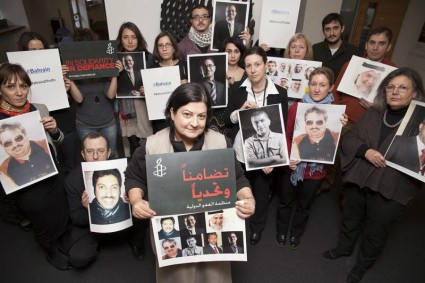 Ebrahim Sherif’s wife and others show solidarity with prisoners of conscience in Bahrain
Ebrahim Sherif’s wife and others show solidarity with prisoners of conscience in Bahrain
Bahraini prisoners on hunger strike in protest at mistreatment
13 February, 2013 – PressTV
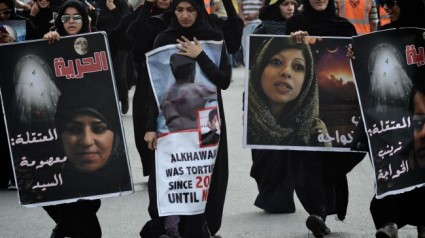
Bahraini women hold portraits of female prisoners during a rally in Janosan Village, in the western suburb of Manama, on May 18, 2012.
Several political prisoners have gone on a hunger strike in a prison in Bahrain in protest at the mistreatment of prisoners by prison officials, a report says.
The hunger-strikers took the initiative due to the violation of their basic rights and the dire condition of their living in the prison.
The Bahraini prisoners are deprived of their preliminary human rights, including visiting their families, which is the positive proof of illegal behavior of prison officials.
This came amid the continuation of anti-regime protests and the Bahraini people’s demands for the immediate release of political prisoners.
Bahrainis have been staging demonstrations since mid-February 2011, demanding political reform and a constitutional monarchy, a demand that later changed to an outright call for the ouster of the ruling Al Khalifa family following its crackdown on popular protests.
Dozens of people have lost their lives in the crackdown, and the security forces have arrested hundreds, including rights activists, doctors and nurses.
Bahraini demonstrators say they will continue holding anti-regime protests until their demand for the release of prisoners and the establishment of a democratically elected government is met. …source
February 14, 2013 No Comments
Chemical Gas filled streets mark Anniversary of Uprising
Tear gas fills Bahraini capital as hundreds mark uprising anniversary
13 February, 2013 – RT
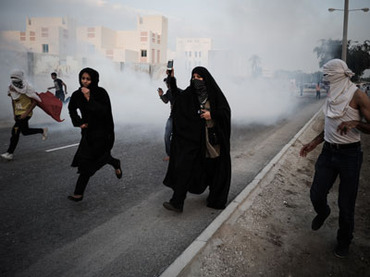
Bahraini protestors run for cover from tear gas fired by riot police following an anti-government rally to demand political reforms on February 12, 2013.(AFP Photo / Mohammed Al-Shaikh)
Bahraini protestors run for cover from tear gas fired by riot police following an anti-government rally to demand political reforms on February 12, 2013.(AFP Photo / Mohammed Al-Shaikh)
Bahraini police have used tear gas and stun grenades to disperse hundreds of protesters in Manama, as they marked the second anniversary of the Shiite-led uprising against the Sunni regime.
Demonstrators tried to march to Pearl Square, the site they occupied two years ago when the protest against the royal family – rulers for over 40 years – first began.
“Square of martyrdom, we all still have the will! Down with the corrupt government!” chanted protesters carrying Bahraini flags as reported by AFP.
“Khalifa resign,” the demonstrators also called, referring to the king’s uncle Prince Khalifa bin Salman, who has been prime minister for four decades.
The attempt to march to the square came after the main Shiite opposition bloc, al-Wefaq, organized a massive protest in which thousands took part in the Shiite village of Sanabis, near Manama.
After the opposition’s rally ended, “a group of saboteurs caused riots and blocked roads, requiring authorities to take legal action against them,” the interior ministry said on Twitter.
Opposition supporters have been demonstrating for more than a week ahead of the anniversary which is set for February 14. A Clandestine radical cyber-group Revolution Youth Coalition has reportedly called for demonstrations marking the date.
During the uprising in 2011, protesters camped for one month at Pearl Square before being forcefully driven out in mid-March. Authorities later razed the square.
Anti-government protesters have been holding demonstrations across Bahrain since that moment, calling for an end to the discrimination of the state’s Shiite majority by the predominant Sunni government.
Eighty people have been killed and thousands arrested since the unrest began. Many opposition figures have been arrested on the allegation of planning to topple the government.
The opposition believes that one of the reasons why Western powers support the “dictatorship” is the crucial US naval military base located in Bahrain. Meanwhile, Bahraini authorities claim the country has no problems with freedom of speech or democracy and denounce protesters as criminals and saboteurs trying to instigate revolution and topple the legitimate government. …source
February 14, 2013 No Comments
US Supplied Black-Hawk helicopters conduct indiscriminate aerial bombings of Bahrain Villages on Anniversary of Uprising
February 14, 2013 No Comments
Bahrain Regime engaged in systematic widespread use of CS Gas in lethal assaults against Children and Elderly
February 14, 2013 No Comments
London Calls for Liberty for Bahrain
February 12, 2013 No Comments
Government Organized Dialogue proceeds with a gun to the head and backdrop of brutality with impunity
Bahrain’s Dialogue Begins with “Positive Step”
11 February, 2013 – POMED
Bahrain held the first round of its national dialogue on Sunday with dozens of representatives from the main political groups participating. Bahrain’s six main opposition parties participated, as did loyalist parties such as the National Unity Gathering and the Salafi group al-Asala. The government itself only served as the organizer. The National Dialogue’s official spokesperson, Isa Abdulrahman, reported that the parties had agreed to meet twice a week and said that “the focus now rested on ‘building the bridges of trust between all parties.” Sheikh Khaled bin Ali al-Khalifa, Bahrain’s Justice Minister, called the meeting a positive start and said it “confirmed the importance of this dialogue.” The session lasted for more than three hours.
A negotiator from the opposition Democratic Progressive Tribune party, Abdulnabi Salman, said, “So far so good, and we will continue for the next session.” He said the government had not yet proven it was serious, but added, “They showed us that they can listen to us, which is a positive step.” The opposition parties said they would participate in the second session on Wednesday, but that they would discuss their plans on Monday. The dialogue participants agreed to limit the scope of the talks to resolving political differences. The dialogue’s schedule and agenda have yet to be decided.
Prior to the meeting, the opposition remained skeptical about the government’s commitment to reform. Early Saturday, Shi’a protesters lit tire barricades on fire as security forces fired tear gas at them. Police increased security around Pearl Square in Manama and Shi’a areas.
Meanwhile, the Bahrain Center for Human Rights published a report titled “Two Years of Death and Detentions.” It finds “no meaningful improvements made to the human rights situation” and “that on many levels the situation has become more serious.”
…source
February 12, 2013 No Comments


